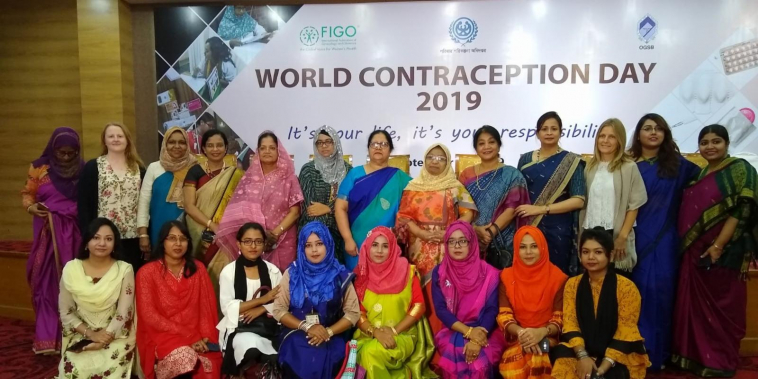Accelerating Family Planning in Bangladesh
Bangladesh is on a journey towards universal family planning, and 26th September 2019 was a major milestone: the first official event recognising World Contraception Day.

Led by FIGO National Member Society the Obstetrical & Gynaecological Society of Bangladesh (OGSB) in partnership with policy makers and key stakeholders, the theme of 'It's your life, it's your responsibility' supported Bangladesh's commitment to ending preventable child and maternal deaths by 2030.
The vision of World Contraception Day is that every pregnancy is wanted, but unintended pregnancies account for approximately one-third of all pregnancies in Bangladesh. Discussion on the integration of modern family planning programmes is critical to help achieve family planning targets. With attendance from the Government of Bangladesh, UNFPA, FP2020, OGSB and FIGO’s Postpartum Intrauterine Device (IUD) Initiative, the event brought public, private and NGO sectors together to share different experiences in family planning programmes.
Professor Sameena Chowdhury, President of OSGB described the significance of the event:
“This is the first year World Contraception Day will be celebrated here in Bangladesh. By organising this event we hope to create mass awareness among policy makers and stakeholders of the importance of addressing the unmet need for contraception in Bangladesh.”
Birth spacing is an effective way to reduce maternal, perinatal and child morbidity and mortality. FIGO’s postpartum family planning programme in partnership with OGSB has trained more than 1,653 providers in postpartum IUD counselling and insertion, and enabled 66,181 women to make an informed choice for themselves and their families.
Professor Parveen Fatima, National Co-ordinator OGSB FIGO PPIUD Project, highlighted the importance of this and other cross-sector partnerships to address existing gaps.
“The contraceptive prevalence rate in Bangladesh is 62 percent, and we have a target to increase this to 75 percent. We really hope our advocacy and training activity will contribute towards reducing the unmet need and increase knowledge and awareness on contraception.
Along with initiatives from the government, public private partnership is key to accelerating the success of family planning programmes. The establishment of strong NGO, public and private partnerships, could help to address programmatic gaps and reduce the unmet need for contraception in Bangladesh”.
Dr Anita Makins, FIGO’s Postpartum IUD Project Director, presented at the event in Dhaka and summarised its success:
“This was an inspiring event which brought together high-level health experts committed to expanding access to contraception and reducing the unmet need in Bangladesh.
The day allowed for a celebration of Bangladesh’s achievements, in terms of reduction in maternal mortality rate and increase in access to contraception. Yet equally importantly, it facilitated conversation on the challenges Bangladesh still faces in achieving FP2020 commitments and the 2030 Agenda for Sustainable Development, including how the different sectors can work together to achieve the Goals – particularly SDG3 and SDG5.
It was also an opportunity for FIGO and OGSB to share the incredible results of our Postpartum IUD initiative in the country, and to call on the government to build on these gains and expand its reach in partnership with OGSB.”
FIGO recognises that working in partnership is key to capacity building, strengthening implementation and encouraging progression towards closing the unmet need for contraception.
We would like to commend the PPIUD Bangladesh team for their initiative and drive in successfully organising and hosting such an important event, and for their continued advocacy in family planning.
With thanks to Professor Sameena Chowdhury (President, OSGB), Professor Parveen Fatima (National Coordinator, PPIUD Bangladesh) and Afroja Yesmin (National Project Manager, PPIUD Bangladesh) for their contributions to this piece.